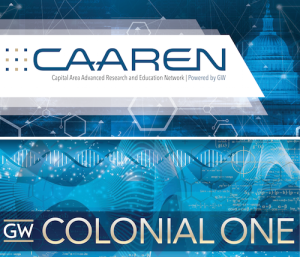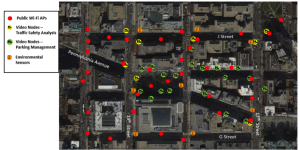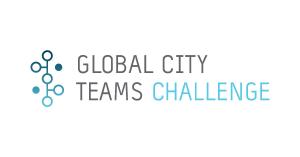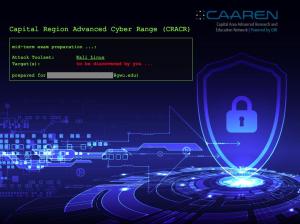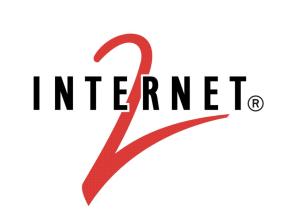Updates from the Capital Area Advanced Research and Education Network (CAAREN):
RESEARCH TECHNOLOGY SERVICES AT GW
Research Technology services enables world-class research at GW through a number of projects and initiatives.
CAAREN Features
CAAREN maintains a 100Gbps DWDM fiber optic network infrastructure for regional institutions connected to Internet2. The pipeline to the regional research and education infrastructure that interconnects key institutions, city centers and governments. CAAREN provides networking services and collaborative research opportunities across the D.C. metro region and manages a shared presence in Equinix for joint research and education network hub operations.
Opportunities from CAAREN
CAAREN provides opportunities for GW researchers to participate in cutting-edge research opportunities within the wider D.C. community, including smart city development and a virtual cyber range environment.
Smarter DC Subgroups
CAAREN is a member of several subgroups as part of the SmarterDC program.
- Infrastructure and Cybersecurity
- Internet of Things Data, Smart Apps and Public Safety
- Monetizing City Assets/P3 Opportunities
PA2040 Project
PA 2040 is a project to actualize today what Pennsylvania Avenue might look like in 2040. In this effort, CAAREN is working with GW researchers to develop and install environmental sensing hubs across the city, starting with Pennsylvania Avenue.
- CAAREN will be used to aggregate live sensing data, provide access to city-wide data repositories and establish an Open Science Data Platform where users can analyze and share environmental sensing, and other data, such as traffic video from sensors built into the modern low-energy street lights.
- Phase two will include nearly ubiquitous Wi-Fi coverage, smart waste management, movement analytics, parking information, smart water fountains and fire house rain water harvesting
Capital Region Advanced Cyber Range
- Cybersecurity training environment representing typical city power plant infrastructure, where sensors and programmable logic controllers are connected to an Internet of Things network.
- At GW, the network is connected to an Open Science Platform where compute and storage resources are available for data processing utilization
- The cyber range moves beyond the typical classroom instruction to deliver hands-on practicums using immersive and true-to-life city-wide systems and operational practices so learners can gain real work experience and practice defending complex IT systems.
Colonial One High Performance Computing Cluster
For research needs that use high-performance computing for data analysis, GW has implemented Colonial One, a shared high-performance computing cluster. Access to Colonial One is open to the university community. Colonial One:
- Provides a coordinated set of individual high-performance nodes, interconnected with high-speed networking, to process and analyze research data.
- Facilitates cutting-edge research for hundreds of GW scientists and engineers.
- GW researchers use Colonial One for research into a variety of subjects, including genomics, particle physics, bioinformatics, computational fluid-dynamics and computational chemistry.
The Things Network
GW is working with The Things Network D.C. community to build an open Internet of Things network in the D.C. region. The network uses low-power, long range (LoRaWAN) technology, open source software and cloud computing to provide communications for sensing devices and applications.
PA2040 Project Updates
PA2040 is a project to actualize today what Pennsylvania Avenue might look like in 2040. In this effort, CAAREN is working with GW researchers to develop and install environmental sensing hubs across the city, starting with Pennsylvania Avenue. CAAREN will be used to aggregate live sensing data, provide access to city-wide data repositories and establish an Open Science Data Platform where users can analyze and share environmental sensing, and other data, such as traffic video from sensors built into the modern low-energy street lights.
CAAREN is currently working with the D.C. government on the process to install the sensors on Pennsylvania Avenue. Once installed, there will be 8 sensors total – 4 air quality sensors and 4 CO2 sensors. Stay tuned for a website where you can view real-time data as well as historical data from the sensors.
UPDATE FROM GLOBAL CITY TEAMS CHALLENGE - SMART AND SECURE CITIES AND COMMUNITIES
This February, the Capital Area Advanced Research and Education Network (CAAREN) joined the Global City Teams Challenge in Washington, DC. This year’s challenge focused on smart and secure cities and communities. The conference brought together hundreds of governments and technology innovators to address shared issues faced by cities and communities.
CAAREN presented on the Capital Region Advanced Cyber Range (CRACR). CRACR is an advanced facility for cybersecurity education and a platform for training, research and experimentation. The cyber range is a well-defined, controlled environment, with a physically accessible virtual cyber infrastructure. Through CAAREN, the cyber range is an open science platform available to the George Washington University (GW) and other community partners.
Currently, the GW College of Professional Studies is leveraging the cyber range for courses. This spring, students can take “Attack Tools & Techniques” and use the cyber range within their course of study and take advantage of the hands-on environment.
The cyber range also offers a space for training and testing Internet of Things (IoT) devices and Industrial Control Systems. The cyber range can be used for actuation, attacks, penetration testing and benchmarking.
View the entire presentation, and learn more about the Global City Teams Challenge on National Institute of Standards and Technology website.
NEW GW COURSE LEVERAGES CAPITAL REGION ADVANCED CYBER RANGE
The George Washington University has teamed up with the Michigan Cyber Range (MCR) to bring a cutting-edge cybersecurity training environment to GW’s Virginia Science and Technology Campus (VSTC). The Capital Region Advanced Cyber Range (CRACR) provides hands-on cybersecurity training opportunities through the Capital Area Advanced Research and Education Network (CAAREN).
CRACR moves beyond the typical classroom instruction to deliver hands-on practicums using immersive and true-to-life city-wide systems and operational practices so learners can gain real work experience and practice defending complex IT systems.
The GW College of Professional Studies currently offers a course titled “Attack Tools & Techniques” that uses the cyber range. The course teaches students to think and assess targets like an attacker, understand the underlying principles of attack tools and construct their own, mitigate attacks, gain hands-on experience and interact in a group environment to accomplish a series of goals.
CRACR is an adaptable cyber range that allows the instructors to craft environments relevant to the topic being discussed and practiced. It allows for hands-on experience with real systems and real tools in an isolated and secure environment. Each student is afforded their own complete environment with full access and control.
The “Attack Tools & Techniques” course is part of a larger program that will teach students how to:
- Understand and implement cybersecurity requirements;
- Investigate and analyze cybersecurity incidents;
- Protect and effectively defend computer networks against malicious activities;
- Identify and correct computer network vulnerabilities through penetration testing and hacking techniques;
- Initiate and undertake critical analysis of security issues to develop and implement security policies and to solve problems; and
- Interact with others in groups or teams in ways that contribute to effective working relationships and the achievement of goals.
UPDATES FROM U.S. UCAN
As a United States Unified Community Anchor Network (U.S. UCAN) Program sponsor, CAAREN provides an opportunity for regional colleges, K-12 institutions, libraries, museums and other institutions to connect to the Internet2 network. Learn more about ongoing projects through this program and how your institution can get involved on the U.S. UCAN website.
Recently, James Werle was named Executive Director of the U.S. UCAN Program. In this role, Werle will work with regional networking partners, community anchor institutions, and Internet2 membership organizations to support mutually beneficial goals of bringing advanced networking, trust and identity services, and advanced applications to learning communities nationwide.
In addition, the Presidential Primary Sources Project (PPSP), Internet2's free distance learning program began in January 2018.
PPSP's interactive video presentations utilize primary source documents and artifacts to teach students about Presidential Legacy and U.S. history. The program will run through the end of March and feature park rangers from the National Park Service and educators from presidential libraries and museums and other organizations.
Please visit the project website for detailed information on all of the programs.


